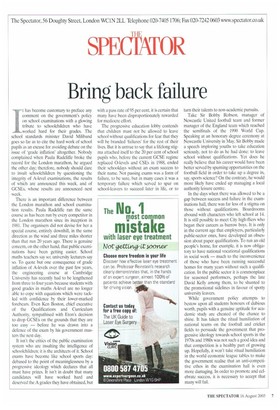Bring back failure
It has become customary to preface any comment on the government's policy on school examinations with a glowing tribute to schoolchildren who have
worked hard for their grades. The school standards minister David Miliband goes so far as to cite the hard work of school pupils as an excuse for avoiding debate on the issue of 'grade inflation' altogether. Nobody complained when Paula Radcliffe broke the record for the London marathon, he argued the other day; therefore, nobody should dare to insult schoolchildren by questioning the integrity of A-level examinations, the results of which are announced this week, and of GCSEs, whose results are announced next week.
There is an important difference between the London marathon and school examination results. Paula Radcliffe ran the same course as has been run by every competitor in the London marathon since its inception in 1981. The organisers did not devise for her a special course, entirely downhill, in the same direction as the wind and three miles shorter than that run 20 years ago. There is genuine concern, on the other hand, that public examinations have been getting easier. School maths teachers say so; university lecturers say so. To quote but one consequence of grade inflation of A-levels over the past few years, the engineering course at Cambridge University has recently had to be lengthened from three to four years because students with good grades in maths A-level are no longer able to cope with equations which were tackled with confidence by their lower-marked forebears. Even Ken Boston, chief executive of the Qualifications and Curriculum Authority, sympathised with Eton's decision to drop GCSEs on the grounds that they are too easy — before he was drawn into a defence of the exam by his government masters the next day.
It isn't the critics of the public examination system who are insulting the intelligence of schoolchildren; it is the architects of it. School exams have become like school sports day: debased to the point of meaninglessness by a progressive ideology which declares that all must have prizes. It isn't in doubt that many candidates will have worked hard and deserved the A grades they have obtained, but with a pass rate of 95 per cent, it is certain that many have been disproportionately rewarded for mediocre effort.
The progressive education lobby contends that children must not be allowed to leave school without qualifications for fear that they will be branded 'failures' for the rest of their lives. But it is untrue to say that a lifelong stigma attached itself to the 20 per cent of school pupils who, before the current GCSE regime replaced 0-levels and CSEs in 1988, ended their schooldays without an exam success to their name. Not passing exams was a form of failure, to be sure, but in many cases it was a temporary failure which served to spur on school-leavers to succeed later in life, or to turn their talents to non-academic pursuits.
Take Sir Bobby Robson, manager of Newcastle United football team and former manager of the England team which reached the semifinals of the 1990 World Cup. Speaking at an honorary degree ceremony at Newcastle University in May. Sir Bobby made a speech imploring youths to take education seriously, not to do as he had done: to leave school without qualifications. Yet does he really believe that his career would have been better served by spurning opportunities on the football field in order to take up a degree in, say, sports science? On the contrary, he would more likely have ended up managing a local authority leisure centre.
In the days when there was allowed to be a gap between success and failure in the examinations hall, there was far less of a stigma on those without qualifications. Boardrooms abound with characters who left school at 14. It is still possible to meet City high-fliers who began their careers as barrow boys. It is only in the current age that employers, particularly public-sector ones, have developed an obsession about paper qualifications. To run an old people's home, for example, it is now obligatory to have national vocational qualifications in social work — much to the inconvenience of those who have been running successful homes for many years without such a qualification. In the public sector it is conunonplace for seasoned performers, perhaps the late David Kelly among them, to be shunted to the promotional sidelines in favour of spotty university leavers.
While government policy attempts to bestow upon all students honours of dubious worth, pupils with a genuine aptitude for academic study are cheated of the chance to shine. It has taken the ritual humiliation of national teams on the football and cricket fields to persuade the government that progressive ideology towards school sports in the 1970s and 1980s was not such a good idea and that competition is a healthy part of growing up. Hopefully, it won't take ritual humiliation in the world economic league tables to make the government realise that an anti-competitive ethos in the examination hall is even more damaging. In order to promote and celebrate success, it is necessary to accept that many will fail.










































































 Previous page
Previous page